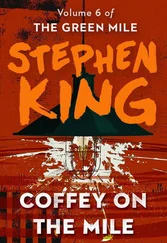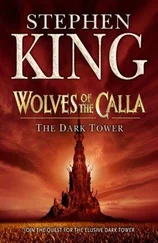Alden thrust the wallet at her. “There e is. There’s my boy. Wif his grampa.”
“Will you drive while I look?” Sammy asked.
“Sure.” Alden took the wheel back. The truck began to move a little faster and a little straighter, although it was more or less straddling the white line.
The photograph was a faded color shot of a young boy and an old man with their arms around each other. The old man was wearing a Red Sox cap and an oxygen mask. The boy had a big grin on his face. “He’s a beautiful boy, sir,” Sammy said.
“Yeah, beauful boy. Beauful smart boy.” Alden let out a tearless bray of pain. He sounded like a donkey. Spittle flew from his lips. The truck plunged, then came right again.
“I have a beautiful boy, too,” Sammy said. She began to cry. Once, she remembered, she had taken pleasure in torturing Bratz. Now she knew how it felt to be in the microwave herself. Burning in the microwave. “I’m going to kiss him when I see him. Kiss him once more.”
“You kiss im,” Alden said.
“I will.”
“You kiss im and hug im and hold im.”
“I will, sir.”
“I’d kiss my boy if I could. I’d kiss his cole-cole cheek.”
“I know you would, sir.”
“But we burrit him. This morning. Right on the place.”
“I’m so sorry for your loss.”
“Have another beer.”
“Thank you.” She had another beer. She was getting drunk. It was lovely to be drunk.
In this fashion they progressed as the pink stars grew brighter overhead, flickering but not falling: no meteor showers tonight. They passed Sammy’s trailer, where she’d never go again, without slowing.
It was about quarter to eight when Rose Twitchell knocked on the glass panel of the Democrat ’s door. Julia, Pete, and Tony were standing at a long table, creating copies of the newspaper’s latest four-page broadside. Pete and Tony put them together; Julia stapled them and added them to the pile.
When she saw Rose, Julia waved her in energetically. Rose opened the door, then staggered a little. “Jeez, it’s hot in here.”
“Turned off the AC to save juice,” Pete Freeman said, “and the copier gets hot when it’s overused. Which it has been tonight.” But he looked proud. Rose thought they all looked proud.
“Thought you’d be overwhelmed at the restaurant,” Tony said.
“Just the opposite. Could’ve shot deer in there tonight. I think a lot of people don’t want to face me because my cook’s been arrested for murder. And I think a lot of people don’t want to face each other because of what happened at Food City this morning.”
“Come on over here and grab a copy of the paper,” Julia said. “You’re a cover girl, Rose.”
At the top, in red, were the words FREEDOME CRISIS EDITION FREE.And below that, in sixteen-point type Julia had never used until the last two editions of the Democrat :
RIOT AND MURDERS AS CRISIS DEEPENS
The picture was of Rose herself. She was in profile. The bullhorn was to her lips. An errant lock of hair lay on her forehead and she looked extraordinarily beautiful. In the background was the pasta and juices aisle, with several bottles of what looked like spaghetti sauce smashed on the floor. The caption read: Quiet Riot: Rose Twitchell, owner and proprietor of Sweetbriar Rose, quells food riot with the help of Dale Barbara, who has been arrested for murder (see story below and Editorial, p. 4).
“Holy God,” Rose said. “Well… at least you got my good side. If I can be said to have one.”
“Rose,” Tony Guay said solemnly, “you look like Michelle Pfieffer.”
Rose snorted and flipped him the bird. She was already turning to the editorial.
PANIC NOW, SHAME LATER
By Julia Shumway
Not everybody in Chester’s Mill knows Dale Barbara—he is a relative newcomer to our town—but most people have eaten his cooking in Sweetbriar Rose. Those who do know him would have said, before today, that he was a real addition to the community, taking his turn at umpiring softball games in July and August, helping out with the Middle School Book Drive in September, and picking up trash on Common Cleanup Day just two weeks ago.
Then, today, “Barbie” (as he is known by those who do know him) was arrested for four shocking murders. Murders of people who are well known and well loved in this town. People who, unlike Dale Barbara, have lived here most or all of their lives.
Under ordinary circumstances, “Barbie” would have been taken to the Castle County Jail, offered his one phone call, and provided with a lawyer if he couldn’t afford one. He would have been charged, and the evidence-gathering—by experts who know what they are doing—would have begun.
None of that has happened, and we all know why: because of the Dome that has now sealed our town off from the rest of the world. But have due process and common sense also been sealed off? No matter how shocking the crime, unproved accusations are not enough to excuse the way Dale Barbara has been treated, or to explain the new Police Chief’s refusal to answer questions or allow this correspondent to verify that Dale Barbara is still alive, although the father of Dorothy Sanders—First Selectman Andrew Sanders—was allowed to not only visit this uncharged prisoner but to vilify him…
“Phew,” Rose said, looking up. “You’re really going to print this?”
Julia gestured to the stacked copies. “It’s already printed. Why? Do you object?”
“No, but…” Rose was rapidly scanning the rest of the editorial, which was very long and increasingly pro-Barbie. It ended with an appeal for anyone with information about the crimes to come forward, and the suggestion that when the crisis ended, as it surely would, the behavior of the residents regarding these murders would be closely scrutinized not just in Maine or the United States, but all over the world. “Aren’t you afraid you’ll get in trouble?”
“Freedom of the press, Rose,” Pete said, sounding remarkably unsure himself.
“It’s what Horace Greeley would have done,” Julia said firmly, and at the sound of his name, her Corgi—who had been asleep on his dogbed in the corner—looked up. He saw Rose and came over for a pat or two, which Rose was happy to provide.
“Do you have more than what’s in here?” Rose asked, tapping the editorial.
“A little,” Julia said. “I’m holding it back. Hoping for more.”
“Barbie could never have done a thing like this. But I’m afraid for him, just the same.”
One of the cell phones scattered on the desk rang. Tony snared it. “ Democrat, Guay.” He listened, then held out the phone to Julia. “Colonel Cox. For you. He doesn’t sound like a happy camper.”
Cox. Julia had forgotten all about him. She took the telephone.
“Ms. Shumway, I need to talk to Barbie and find out what sort of progress he’s making in taking administrative control there.”
“I don’t think that will be happening anytime soon,” Julia said. “He’s in jail.”
“ Jail? Charged with what?”
“Murder. Four counts, to be exact.”
“You’re joking.”
“Do I sound like I’m joking, Colonel?”
There was a moment of silence. She could hear many voices in the background. When Cox spoke again, his voice was low. “Explain this.”
“No, Colonel Cox, I think not. I’ve been writing about it for the last two hours, and as my mother used to say when I was a little girl, I don’t chew my cabbage twice. Are you still in Maine?”
“Castle Rock. Our forward base is here.”
“Then I suggest that you meet me where we met before. Motton Road. I can’t give you a copy of tomorrow’s Democrat, even though it’s free, but I can hold it up to the Dome and you can read it for yourself.”
Читать дальше











